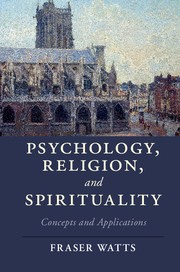Book contents
- Frontmatter
- Dedication
- Contents
- Preface
- 1 Concepts and Approaches
- 2 Psychoanalysis
- 3 Genetics and Evolution
- 4 Brain and Cognition
- 5 Religious Experience
- 6 Religious Practices
- 7 Religious Beliefs and Thinking
- 8 Spirituality
- 9 Developmental Aspects
- 10 Varieties and Types
- 11 Health and Adjustment
- 12 Personal Transformation
- 13 Scripture and Doctrine
- 14 Human Nature and Personality
- 15 Summing-Up
- Further Reading
- References
- Index
- Frontmatter
- Dedication
- Contents
- Preface
- 1 Concepts and Approaches
- 2 Psychoanalysis
- 3 Genetics and Evolution
- 4 Brain and Cognition
- 5 Religious Experience
- 6 Religious Practices
- 7 Religious Beliefs and Thinking
- 8 Spirituality
- 9 Developmental Aspects
- 10 Varieties and Types
- 11 Health and Adjustment
- 12 Personal Transformation
- 13 Scripture and Doctrine
- 14 Human Nature and Personality
- 15 Summing-Up
- Further Reading
- References
- Index
Summary
So far we have been considering religion in very general terms. Now we will redress the balance and get down to looking at the different facets of religion, one by one. A series of scholars have set out slightly different lists of the various facets of religion, but I will work here with the fairly simple one set out in Chapter 1. So, the next three chapters will look in turn at religious experience, practices, and beliefs, starting in this chapter with religious experience.
William James
We will start this chapter historically, looking once again at William James's Varieties of Religious Experience (James, 2012/1902). It has undoubtedly been a successful book, probably both James's most widely read book, and the most widely read book in the psychology of religion. Despite that, it has always been controversial and much criticized.
James had an ambivalent attitude to religion, being generally sympathetic to it and certainly respectful of it, but he was not a regular church-attender or able to make full creedal assent. His book is, on the face of it, a scientific study of religion, but James perhaps hoped that it would also be a scientific defense of religion. He remarked that writing the book was in itself a religious act.
The first chapter, as we have already seen, is a rebuttal of materialism and “nothing but” reductionism. In the next chapter, “Circumscription of the Topic,” James sets out his program. It is notable that he proposes to focus on religious experience, apparently regarding it as foundational to all other aspects of religion (sociocultural, cognitive-credal, etc.). It is a later flowering of the new turn in theology initiated by Schleiermacher (1958/1799), which focused on the feeling of absolute dependence and grounded other aspects of religion in experience. In emphasizing experience, James is probably focusing on the aspect of religion most congenial to him. It also enables him to emphasize religious universalism, which was also clearly attractive to him.
The emphasis on experience is given an extra twist by James's individualism, which, he says, is founded on feeling. That emphasis on individualism is reflected in his definition of religion as “the feelings, acts, and experiences of individual men in their solitude, so far as they apprehend themselves to stand in relation to whatever they may consider the divine” (p. 31).
- Type
- Chapter
- Information
- Psychology, Religion, and SpiritualityConcepts and Applications, pp. 52 - 63Publisher: Cambridge University PressPrint publication year: 2017



